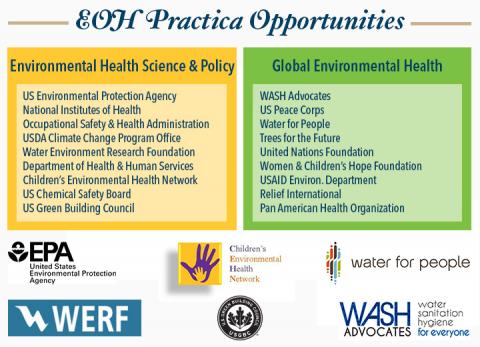Associate Professors Peter LaPuma and Sabrina McCormick, who direct Practice Experiences for the Environmental and Occupational Health Department, weren’t surprised when the Princeton Review announced that George Washington University ranks number one in the nation for student internships.
The data used in the Princeton Review ranking was collected from surveys of students and administrators at 650 colleges and universities during the 2013-14 academic year. Payscale.com surveys of alumni also were considered.
“One of the best things about our Environmental and Occupational Health program is the rich opportunities for students to find internships to complete their practicum requirement,” says LaPuma, who directs practice experiences for EOH’s Environmental Health Science and Policy program. “There is a very high density of federal, consulting and advocacy environmental organizations in Washington, DC and our students seem to be very successful at finding internships, which can often turn into long-term jobs.”
Environmental and Occupational Health students have gained practice experience at more than 60 organizations in the District of Columbia, Maryland, and Virginia, LaPuma and McCormick say.
“GW’s extensive network enables students to partner with the very top local national or international organizations that work in environmental and occupational health, “ says McCormick, LaPuma’s counterpart for the Global Environmental Health program. “I’ve seen many students’ lives transform as they learn to apply academic knowledge and theory in real-world professional practice settings.”
“I am often amazed at the new organizations I am still discovering beyond the better known agencies like EPA, OSHA and CDC,” LaPuma says. “You can even find Environmental and Occupational opportunities tucked away in organizations like the World Bank, the IRS, or the State Department because every large agency always has EOH issues to deal with. Even though agencies like the IRS can have satellite locations all over the nation, most of these agencies have their mothership right here in Washington, DC.”
In fact, LaPuma points out that he has “more mentors at these organizations wanting to work with our students than I have students to give.” GW always sends out a questionnaire to mentors when a student finishes their practicum experience asking if the mentors are willing to continue working with GWU students in the future. “In 5 years and 100 students, I have never had anyone say no. It’s often an enthusiastic ‘absolutely,’" LaPuma says.
An added bonus is GW’s Knowledge in Action Career and Internship Fund, which supports students participating in internships at organizations that lack the resources to pay a wage. To date, the fund has awarded more than $255,000 in funding to more than 140 GWU undergraduate and graduate students.


